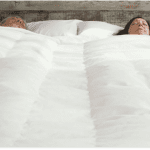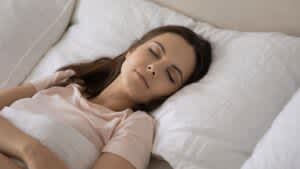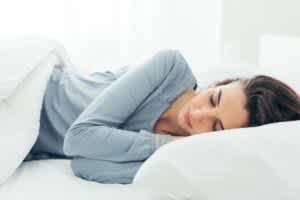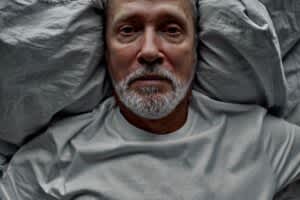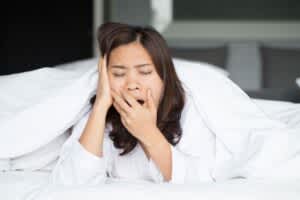Sleep is vital for maintaining health and well-being. During sleep, we become unconscious while many cognitive and physical functions remain active. These processes work to restore our health and optimize our waking functions.
When humans are deprived of sleep, physical and mental health can become significantly negatively affected. Over 35% of adults in the U.S. obtain less than the recommended seven hours of sleep per night. Children and teenagers need more sleep than adults, but a majority of middle and high school students also fall short on sleep.
Obtaining the recommended amount of sleep provides many health benefits.Those who sleep enough enjoy a better mood, less stress, better decision-making, and a lower risk for getting sick or experiencing health problems.
The Science of Sleep
Humans, along with most animals and plants, have an internal body clock that is naturally attuned to a 24-hour day-night cycle. This internal clock oversees circadian rhythms, or bodily functions that fluctuate over each day, such as metabolism, body temperature, and hormone release. Two hormones that fluctuate each day play a significant role in our sleep patterns: melatonin and cortisol.
Melatonin prepares the body for sleep, and the brain releases it when the eyes are exposed to darkness. Conversely, exposing eyes to light blocks melatonin production, making a person feel more awake. Light from both natural and artificial sources can inhibit melatonin release. This processing of light and darkness signals to the brain whether it is daytime or nighttime, informing the body if it should be awake or asleep.
Cortisol promotes alertness and gives people energy. While melatonin dips early in the day and peaks at night, cortisol follows an opposite pattern. People who have a healthy sleep-wake schedule experience the lowest levels of cortisol before going to sleep and highest levels in the morning. Cortisol receptors are located throughout the human body, so its release can impact many bodily functions. Because cortisol is often released in response to stress, it is often referred to as the stress hormone.
The sleep drive, a mechanism that promotes sleepiness and controls the intensity of sleep, also works with circadian rhythm to help regulate waking and sleeping patterns. The sleep drive is supported by the release of adenosine in the brain, which is a product of cells using energy. Other factors can also impact how tired a person feels by affecting circadian rhythm, including work shift times, jet lag, and genetic changes.

Stages of Sleep
As humans rest, we experience a set of distinct sleep phases. Researchers categorize sleep into these stages according to differences in wakefulness and brain activity. All sleep stages fall under one of two primary types of sleep: rapid eye movement (REM) sleep and non-rapid eye movement (NREM) sleep.
Over the course of a night, people cycle through three NREM phases and one REM sleep stage multiple times.
- Stage 1 NREM (N1): In this phase of light sleep, you transition from being awake to sleeping. Your muscles relax, while your heart rate and breathing decrease. Humans typically spend about one to five minutes per sleep cycle in N1, which makes up about 5% of the full sequence.
- Stage 2 NREM (N2): Breathing and heart rate continue to decrease in this phase. Muscles relax and the eyes stop moving, as the brain and body prepare to drift into deeper sleep. As sleep cycles continue through the night, humans spend more time in this phase.
- Stage 3 NREM (N3): In the first half of the night, you spend more time in this period of deep sleep as heart rate and breathing patterns slow to their lowest rates of the night. This deep sleep contributes to feelings of restoration after awakening.
- REM Sleep: When sleepers reach the REM period, the eyes quickly shift beneath the eyelids and breathing speeds up, becoming more staggered and inconsistent. Dreaming may occur during any sleep stage but is most common during this phase. Muscles stop moving during REM sleep, so sleepers cannot physically perform actions from their dreams.
How Much Sleep Do We Need?
Each age group needs a different amount of sleep per day, though the exact amount of sleep needed differs for each individual person. Sleep is a critical element of cognitive and emotional development. As a result, infants, children, and teenagers require more sleep than adults because of their developmental needs. As we age, we require less sleep each night.
Sleep experts have outlined sleep recommendations by age.
Age Group | Age | Sleep Recommendation for 24-Hour Period |
|---|---|---|
Newborn | 0–3 months | 14–17 hours, including naps |
Infant | 4–12 months | 12–16 hours, including naps |
Toddler | 1–2 years | 11–14 hours, including naps |
Preschool | 3–5 years | 10–13 hours, including naps |
Child | 6–12 years | 9–12 hours |
Teenager | 13–18 years | 8–10 hours |
Adult | 18–60 years | 7 or more hours |
Older Adult | 61–64 years | 7–9 hours |
Older Adult | 65 years and above | 7–8 hours |
Health and Lifestyle Factors That Influence How Much Sleep You Need
Specific sleep needs depend on an individual’s health, genetic traits, and lifestyle choices. Multiple factors can influence the amount of sleep someone may need.
- Physical Activity Levels: More active people may require increased amounts of sleep. For example, experts report that the restorative nature of sleep is crucial for high-level athletes during times of increased physical demand.
- Stress: Research suggests that stress and sleep both affect one another. Being stressed can negatively impact sleep, and sleeping poorly can increase stress. For this reason, meeting sleep recommendations is especially important for people experiencing anxiety or stress.
- Illness: Sleep appears to play a key role in immune health. Insufficient or poor-quality sleep weakens the immune system and has been shown to increase catching the common cold.
Determining How Much Sleep You Need
Each person is different, so there is no one-size-fits-all number defining the amount of sleep you need each night. Some adults function fine on seven hours per night, while others need eight or nine hours of sleep. As such, it is important to identify your sleep needs. Additionally, just one night of sleep deprivation can lead to decreased mental performance, though these effects improve after recovering lost sleep time.
If you sleep six or seven hours each night and feel excessively tired during the day, you may benefit from sleeping an extra hour every night. That said, if you sleep too much or too little to the degree that it impedes your daily life, you might want to reach out to your doctor. Additionally, experiencing excessive daytime sleepiness even after consistently sleeping the recommended amount for your age group each night can be a sign of an underlying condition.
Why Is Sleep Important?
Sleep is immensely important because it is a necessary component of good health. Disrupted sleep can negatively affect physical and mental health. For example, research reveals that shift workers whose circadian rhythms become disturbed by working at night and sleeping during the day may be more likely to develop conditions such as depression, diabetes, and breast cancer.
Along with serious negative health outcomes, a lack of sleep can affect day-to-day life. Increased daytime sleepiness caused by sleep deprivation may make it difficult to socialize, focus on tasks, learn, and recall memories. Drowsiness may make driving risky as well, putting a drowsy driver and anyone else on the road with them at higher risk of an accident.
There is no single explanation clarifying why sleep impacts human life so immensely. Sleep researchers have developed multiple theories explaining the importance of sleep.
The Energy Conservation Theory
According to the energy conservation theory, sleep evolved as a way for mammals to save energy. Sleep is connected to metabolism, a chemical process that allows the body to transform food into energy. Research indicates that human metabolism slows significantly during sleep, suggesting we use this time to save energy for more active periods.
The Restorative Theory
Researchers that support the restoration theory posit that sleep helps the body repair itself. Studies suggest that sleep is linked to hormones and cells involved in growth, cell repair, and tissue regeneration. For example, a study of individuals who recently underwent rotator cuff surgery revealed that sleep quality was key in their healing process. Healthy sleep is also associated with better immune health.
Sleep may help restore the body through the use of stem cells. During sleep, genes related to circadian processes appear to promote the activation of stem cells. Stem cells are cells that support tissue regeneration by repairing damaged organs and tissue. Sleep may also protect stem cells from aging too quickly.
The Brain Plasticity Theory
The brain plasticity theory states that sleep is crucial for brain development and functioning. Growing evidence suggests that better sleep quality aids newborn brain development, and sleep disturbances negatively affect infant growth and overall health.
Studies also indicate that sleep may help with learning processes by supporting memory storage. Sleep loss disrupts mental functioning and performance, making it more difficult to remain alert, learn new information, and process memories.
Tips for Better Sleep
You can improve your sleep by focusing on a few key lifestyle changes. However, if sleep issues get in the way of your day-to-day activities, consider reaching out to your doctor to rule out possible underlying conditions.
Improve Your Sleep Environment
A sleep environment comprises several factors, including temperature, sound, and light. While everyone has individual preferences for the ideal bedroom temperature, research suggests that cool temperatures more positively affect sleep patterns. Warmer temperatures increase overall alertness, keeping sleepers in a more wakeful state.
Noise can disrupt sleep, but not everyone has an environment that allows them to enjoy complete silence in their bedroom. Intentionally using soothing ambient sounds can block background noise and promote sleep. For example, research has shown listening to white noise helps people fall asleep and improves the quality of their sleep.
Similarly, bedroom lighting can influence sleep habits. Excess light in the bedroom — whether artificial or natural — can cause a person to take longer to fall asleep and wake more frequently throughout the night. Keep lights dim or use red light in the bedroom, a type of light that has been shown to not affect sleep.
Shop the Best Mattresses of 2025Optimize Your Sleep Schedule
Sleep experts recommend going to sleep at the same time each night and waking up at the same time each morning, even on weekends and vacations. Research shows that maintaining a consistent sleep schedule may provide health benefits. That said, using the weekends to catch up on sleep also appears to provide benefits too, so don’t be afraid to sleep in when needed.
Establish a Bedtime Routine
Engaging in the same rituals each night before bed can help your body prepare for sleep. A bedtime routine may include grooming, such as brushing your teeth and taking a bath, or relaxation, such as meditation or visualization.
Relaxation techniques can also reduce stress, which is known for making it more difficult to fall and remain asleep. Certain substances, such as caffeine, alcohol, and nicotine, should not be part of a nightly routine. These can disrupt sleep patterns and make it difficult to achieve a full night’s rest.
Avoid Electronics Before Bed
Electronic devices, such as phones, tablets, and video games, can increase arousal and wakefulness because of the blue light they emit. As a result, using devices at night may disrupt our ability to fall and remain asleep.
Research indicates that 90% of adults regularly use an electronic device within one hour of their bedtimes. If you are one of the many in the habit of using digital devices at night, try keeping them outside of your bedroom, so you are less tempted to look at them during your nightly routine.
Exercise Regularly
Consistently exercising can improve sleep health by increasing sleep quality and reducing daytime sleepiness. Even a single moderate or intense exercise session can improve sleep, as well as lower blood pressure and reduce stress.
Frequently Asked Questions About Why We Need Sleep
Adults typically need seven or more hours of sleep per night, and younger adults generally sleep more than older adults. Babies, children, and teenagers all need more sleep than adults, but require less sleep as they age.
Experts recommend that adults sleep for at least seven hours per night. The exact amount of sleep needed varies on an individual basis, so some people might need eight hours of sleep while others do not. Sleep is a vital element of health, and being even slightly sleep-deprived can negatively affect mental and physical well-being.
REM sleep seems to promote learning and memory consolidation, though researchers are not completely sure how it works. REM also appears to help people sleep for longer time periods, with fewer interruptions.
Occasionally staying up all night can lead to negative health effects, though they will likely subside when you catch up on sleep in the following days. Consistently pulling all-nighters, however, can significantly affect your health, worsening mental performance the next day.
References
The Sleep Doctor Forum: Real Experiences, Real Connections
Continue the discussion on the Sleep Doctor Forum. Connect with experts and fellow forum members on CPAP, sleep apnea, and all things sleep. A priceless resource that’s free to join.













